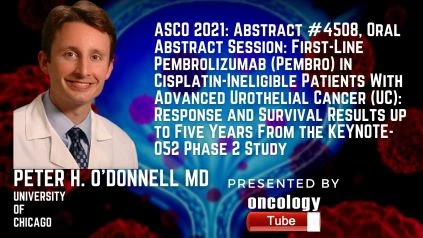Peter H. O’Donnell, MD from the University of Chicago speaks about the ASCO 2021 Abstract – Oral Abstract Session: First-Line Pembrolizumab (Pembro) in Cisplatin-Ineligible Patients With Advanced Urothelial Cancer (UC): Response and Survival Results up to Five Years From the KEYNOTE-052 Phase 2 Study.
Link to Abstract:
https://meetings.asco.org/abstracts-presentations/195585
Background information:
Pembro was authorized based on preliminary data from the phase 2 KEYNOTE-052 trial (NCT02335424), which revealed a 29 percent ORR in cisplatin-ineligible patients with untreated advanced UC. The results are updated after up to 5 years of follow-up.
Methodologies:
KEYNOTE-052 is an open-label, single-arm, multi-site experiment. Patients had advanced or metastatic UC, were ineligible for cisplatin (ECOG PS 2, CrCl 30 to 60 mL/min, grade 2 peripheral neuropathy/hearing loss, NYHA class III heart failure), and had never had chemotherapy for advanced or metastatic illness. Pembro 200 mg IV Q3W was given to patients until progression, intolerable toxicity, withdrawal, or 24 months of treatment, whichever came first. The number of PD-L1–staining cells [tumor cells, lymphocytes, macrophages] divided by the total number of viable tumor cells, multiplied by 100, was used to assess PD-L1 status; PD-L1–positive was CPS 10. ORR was verified as the major end goal (RECIST v1.1, independent central review). The duration of response (DOR), overall survival (OS), and safety were all important secondary end objectives.
The following are the outcomes:
The median age of the 370 patients was 74 years, 315 (85.1%) had visceral illness, and 43 (11.6%) completed 24 months of treatment. The median period from enrollment to data cutoff (Sep 26, 2020) for all patients was 56.3 months (range: 51.2-65.3), and 56.0 months (range: 51.4-65.2) for the 110 patients (29.7%) with CPS 10. All patients had a confirmed ORR of 28.9% (95 percent CI: 24.3-33.8); full response was 9.5 percent (n=35), and partial response was 19.5 percent (n=72). The median DOR was 33.4 months (range: 1.4 to 60.7 months); 44.8 percent and 39.4 percent of patients, respectively, had DORs of 36 and 48 months (Kaplan-Meier estimates). The median OS was 11.3 months (95 percent confidence interval: 9.7-13.1); the 24- and 36-month OS rates were 31.5 percent and 22.1 percent, respectively. Patients with a CPS of ten had better results than those with a CPS of ten (Table). 67.3 percent of patients experienced treatment-related adverse events (AEs); 21.1 percent of treatment-related AEs were grade 3 or higher, including one fatality (myositis).
Final Thoughts:
Pembro continued to elicit clinically relevant, sustained anticancer activity in cisplatin-ineligible patients with advanced UC after up to 5 years of follow-up. In individuals with CPS 10, these effects were more prominent.
Clinical trial information: NCT02335424
http://clinicaltrials.gov/show/NCT02335424

